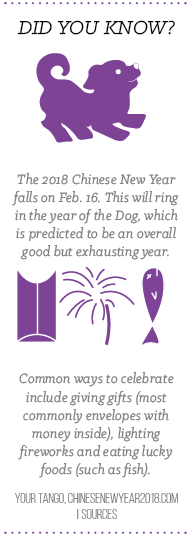For years I have battled with the question of “Who am I?”
According to my bloodline, I am Chinese; according to my citizenship, I am American. According to those who know me, however, I am an “ABC”- American Born Chinese- or Chinese-American. Nevertheless, people continually question my identity. To the general Chinese population, I am strictly American. To the general American population, I am Chinese (sometimes even Japanese, Korean or just “Asian”).
As an angsty teen, I often ask myself whether or not I truly fit in. But today, I won’t tackle that question; instead, I will answer a seemingly more trivial one: “How do you pronounce my last name ‘Peng’?”
In Chinese (simplified) characters, my full name is 彭慧琳; its “pinyin,” the romanization of written Chinese, is Péng Huìlín. But don’t be fooled, these phonics and accents do not follow the standard American pronunciation. They follow a difficult and completely separate Chinese one.
Of course, that particular name did not stick; it’s not on my birth certificate and only exists within the realm of speech. My name, as some of you may know or can read from the byline, is Heidi Peng. And that neat little Huìlín fell fromits pedestal of my first name and became my middle name. Now, before we get into my surname’s pronunciation, allow me to tell you a little story.

It was 2001, the Chinese year of the snake. My parents tried to decide whether I should be named Little Dragon, Huìlín or some American name; thankfully, they decided on the latter choice. In September, Heidi was born. Then in 2005 came preschool, which signaled the beginning of my inner turmoil and struggle for self-identity; the scene played out perfectly in my head. My 4-year-old self would say, “Hi! I’m Heidi Peng” with perfect American and Chinese intonation, but the teacher soon threw me for a loop. She called out my name, asking, “Is Heidi Peng here?” but she pronounced “Peng” “Pang,” like “bang” with a “p.” In an instant, I lost my identity as the Chinese Heidi 彭 and traded it in for the Chinese-American Heidi “Pang.” In some sense, I lost the ability to move fluidly through my two worlds: the Chinese one and the American one. I became known as the Chinese girl who lived in an entirely separate American world. I was, and always have been, called by my Americanized surname at school. No longer did my surname have meaning to the rest of the world. My surname gave me part of my identity and I did not feel complete without it. But over time, I became conditioned to it; what used to bother me, now feels like an ordinary occurrence. In a way, it has added a new layer to my identity and has become a part of the person I have grown to appreciate today.
It may seem like I’m overreacting, but rest assured, I’m not. Every day, people’s surnames are pronounced in the most incorrect ways. This doesn’t solely apply to Asians, but it can be particularly bad for us. Surnames can evoke a sense of identity almost as much as first names can. They should not be treated as mere words or letters on a page; there’s meaning and a person underneath that name.
I’m not saying people need to suddenly correct their pronunciations and try to fix a 10-year habit, but be wary of what you’re saying and to whom you’re saying it. This story goes beyond pronunciation and beyond race. It’s about respect; it’s about regard of others and their cultures.
With Chinese New Year approaching, take this opportunity to learn about someone else’s culture, and most importantly take the time to appreciate it.
With that said, my surname is pronounced “p-euh-ng.” It’s spelling is a daunting one; many of you will not attempt to pronounce it. For those who do, I applaud you. Pronunciation is not about saying it right, especially since Chinese is a difficult language to learn and articulate, but it’s the effort that counts.
The views in this column do not necessarily reflect the views of the HiLite staff. Reach Heidi Peng at hpeng@hilite.org.

































![AI in films like "The Brutalist" is convenient, but shouldn’t take priority [opinion]](https://hilite.org/wp-content/uploads/2025/02/catherine-cover-1200x471.jpg)









































![Review: “The Immortal Soul Salvage Yard:” A criminally underrated poetry collection [MUSE]](https://hilite.org/wp-content/uploads/2025/03/71cju6TvqmL._AC_UF10001000_QL80_.jpg)
![Review: "Dog Man" is Unapologetically Chaotic [MUSE]](https://hilite.org/wp-content/uploads/2025/03/dogman-1200x700.jpg)
![Review: "Ne Zha 2": The WeChat family reunion I didn’t know I needed [MUSE]](https://hilite.org/wp-content/uploads/2025/03/unnamed-4.png)
![Review in Print: Maripaz Villar brings a delightfully unique style to the world of WEBTOON [MUSE]](https://hilite.org/wp-content/uploads/2023/12/maripazcover-1200x960.jpg)
![Review: “The Sword of Kaigen” is a masterpiece [MUSE]](https://hilite.org/wp-content/uploads/2023/11/Screenshot-2023-11-26-201051.png)
![Review: Gateron Oil Kings, great linear switches, okay price [MUSE]](https://hilite.org/wp-content/uploads/2023/11/Screenshot-2023-11-26-200553.png)
![Review: “A Haunting in Venice” is a significant improvement from other Agatha Christie adaptations [MUSE]](https://hilite.org/wp-content/uploads/2023/11/e7ee2938a6d422669771bce6d8088521.jpg)
![Review: A Thanksgiving story from elementary school, still just as interesting [MUSE]](https://hilite.org/wp-content/uploads/2023/11/Screenshot-2023-11-26-195514-987x1200.png)
![Review: "When I Fly Towards You", cute, uplifting youth drama [MUSE]](https://hilite.org/wp-content/uploads/2023/09/When-I-Fly-Towards-You-Chinese-drama.png)
![Postcards from Muse: Hawaii Travel Diary [MUSE]](https://hilite.org/wp-content/uploads/2023/09/My-project-1-1200x1200.jpg)
![Review: "Ladybug & Cat Noir: The Movie," departure from original show [MUSE]](https://hilite.org/wp-content/uploads/2023/09/Ladybug__Cat_Noir_-_The_Movie_poster.jpg)
![Review in Print: "Hidden Love" is the cute, uplifting drama everyone needs [MUSE]](https://hilite.org/wp-content/uploads/2023/09/hiddenlovecover-e1693597208225-1030x1200.png)
![Review in Print: "Heartstopper" is the heartwarming queer romance we all need [MUSE]](https://hilite.org/wp-content/uploads/2023/08/museheartstoppercover-1200x654.png)




